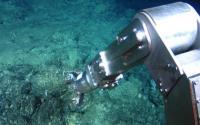DSHMRA

The Deep Seabed Hard Mineral Resources Act accelerates the program of environmental assessment, exploration, and commercial recovery of hard mineral resources of the deep seabed, and ensures that such exploration is conducted in a manner which will encourage the conservation of such resources.
Quicktabs: Keywords
Indeed, this was the U.S. position prior to UNCLOS III. Years earlier, Congress made clear the U.S. position on the legality of deep seabed mining in the Deep Seabed Hard Mineral Resources Act of 1980 (DSHMRA):
[I]t is the legal opinion of the United States that exploration for and commercial recovery of hard mineral resources of the deep seabed are freedoms of the high seas subject to a duty of reason- able regard to the interests of other states in their exercise of those and other freedoms recognized by general principles of international law.10
The U.S. position set forth in 1980 in DSHMRA and again in 1983 at UNCLOS III remains the same today. According to the Restatement of the Law, Third, of the Foreign Relations Law of the United States, U.S. citizens and corporations may engage in seabed mining regardless of whether the U.S. accedes to UNCLOS, provided that they conduct such mining without claiming sovereignty over any part of the seabed and as long as the mining activities are exercised with due regard to the rights of other nations engaged in mining.11 As related by the Restatement, “like the fish of the high seas the minerals of the deep sea-bed are open to anyone to take.”12
Groves said the Deep Seabed Hard Mineral Resources Act (DSHMRA) of 1980 set forth the mechanism for com- panies like Lockheed Martin to obtain its licenses to engage in deep seabed mining and to renew their claims in the eastern Pacific Ocean. These licenses were obtained by Lockheed nearly 40 years ago and are known as legacy claims that pre-date the Law of the Sea, he maintains.
Under U.S. and international law, Groves said Lockheed Martin has every right and ability to engage in deep seabed mining.
“These [legacy claims] go back to pre-Law of the Sea Treaty. They had to be specifically written into the annexes of the Treaty, and so we [the United States] have those claims,” Groves said, underscoring the argument that DSHMRA already covers rights and titles over claims in international waters.
“Lockheed Martin has just decided at this point in time that it is not economically feasible for them to do it. Now what they do, and what’s their right as a company to do, is lobby the Senate, making a claim. This is not a fact, this is not set in granite, this is a claim that they need the treaty in order to get the necessary certainty to engage in the expensive process of deep seabed mining.”
